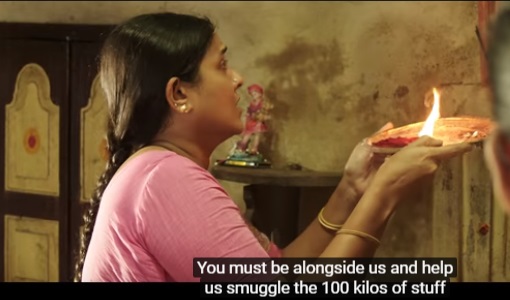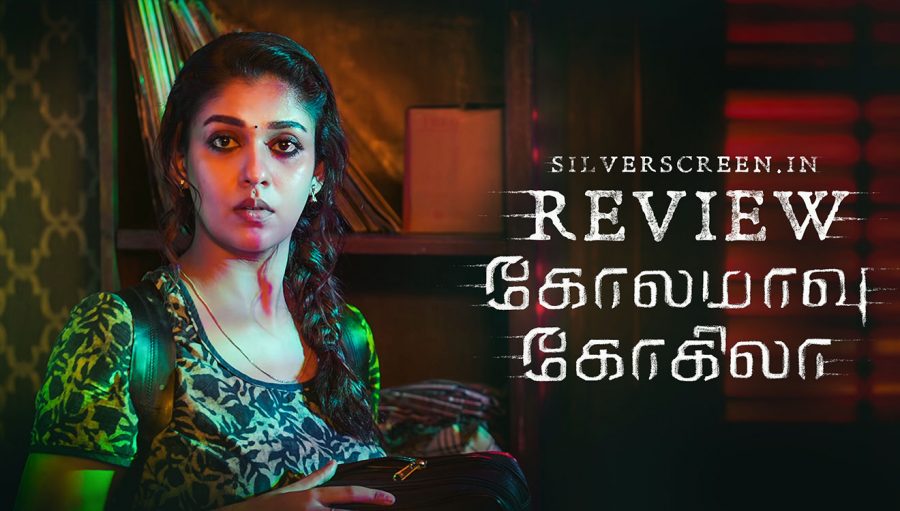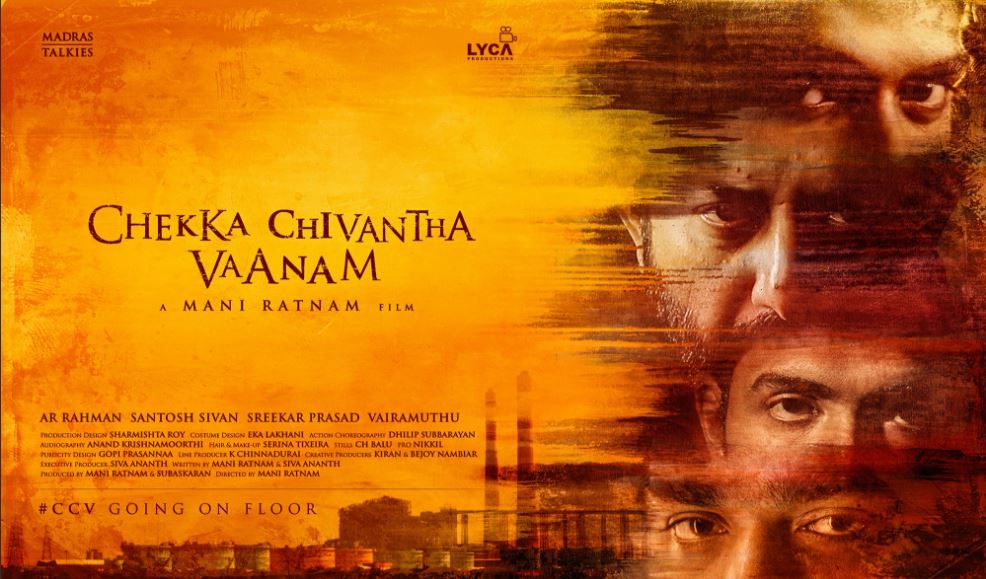Cast: Nayanthara, Yogi Babu, Saranya Ponvannan
Director: Nelson Dilipkumar
Music: Anirudh Ravichander
What an absolutely lovely time this is for the leading women in Tamil cinema. If Jyothika somewhere is using her might to stir the female masses that adore her into a domestic rebellion of sorts, Nayanthara, through Aramm, and now Kolamaavu Kokila, opens up newer, more thrilling avenues. Jyothika’s language might be less nuanced and subtle, but it reflects the need from her fanbase for brash heroism. In 36 Vayathinile and Magalir Mattum, her most recent work, Jyothika squarely aimed at the womenfolk engaged in menial, often unrewarding labour behind closed doors, but Nayanthara’s landscape is one where women are naturally at work – with challenges that alternatively have no bearing on, and target their gender.
It wouldn’t be an exaggeration to call Kolamaavu Kokila, whose name is well-aligned with its neo-noir sensibilities, brilliant. If in Aramm, the low angle shots sought to present a hero, a saviour, with larger ambitions and a distinct social responsibility, Kolamaavu… is gloriously immoral. Nelson Dilipkumar is not the filmmaker that Gopi Nainar is of course, they’re different as night and day, but Nayanthara is at the heart of the film; an actress, who – unlike leading heroes that revel in their popularity and associated gimmicks one film after another – is quick to shed skins, and is uninhibited enough to experiment with bolder, darker roles.
In Kolamaavu, her entry is modest, she’s presented on screen without much ado, after a quick cut – something that would perhaps go unnoticed if not for the deafening cheers. And boy, is that heartening to hear – here’s an actress, fully clothed in an ankle-length skirt and an unflattering blouse, being celebrated for reasons other than her body. Nayanthara is beautiful as Kokila, all beguiling large-eyed innocence, the elder daughter in a family that doesn’t exactly struggle to make ends meet, but where every penny is of import nevertheless.
Nelson is swift in establishing his characters, right in the opening shot. He doesn’t dwell a lot on his lead either. When Kokila is introduced, she’s negotiating a raise with her manager; he’d take it up with the boss of course, if she’d only meet him outside of work. She glances at him, righteous indignation one instant, and what seems like coy welcome the next; if that’s the clincher, Kokila declares, all soft, timid and guileless, then she’d rather sleep with the boss – now, wouldn’t that be a better deal, any day? That really is how Nelson tells his audience – in a splendid display of agency, choice and a subtle switch of power – that his leading lady isn’t what she seems.

With Saranya Ponvannan too, he creates the illusion of delivering the regular – when Saranya is introduced at first, she’s making dosas and berating her husband; caustic and endearingly funny, there’s no hint of the reserve of steel she would become later when confronted with a situation that potentially threatens the family. Even then, Nelson ensures that those sudden flourishes of humour – something that Saranya so lovingly nurtures and has a penchant for – are not lost. There’s no rapid descent into melodrama; Saranya is almost business-like when she prepares her kin for when she’s not around; and then, when her daughter seems entangled in a situation that she doesn’t entirely approve of, Saranya turns model parent.
But Nelson is clever enough to allow a grim sense of resignation to set in before he ushers Saranya in as the one-woman henchman to her daughter. Of course, she doesn’t exactly raze down thugs – not at first – but hustles her family into braving their circumstances in her own inimitable way. It’s one of those moments when Nelson wins, wins, wins. His actions heroes are all women, and he doesn’t victimize them come what may.
Recommended
Kolamaavu… can be perceived as a coming-of-age tale in its own twisted way. A screwball crime and comedy where there are no repercussions, blasphemous as it seems to hold the film to the ideals of the real world. Kokila is not a fragile thing to begin with, but the gradual …evolution of her moral compass is a delight to watch. Nelson lends her Jekyll-Hyde-like attributes; a spa manager by morning, and drug peddler by noon, and someone who would do just about anything – even kill – to protect herself and her family.
This is no Nayanthara of Aramm, working for the greater good; Kokila’s focus is mostly inward, concentrated on her family that has its own set of quirks. Placing her amidst a set of hardened gangsters, Nelson showcases some lovely contrasts, right from pulpy visuals – a bangle-adorned hand holding a gun – to scenes that convey breadth of character: when Kokila discovers that the drug kingpin has a thing for her, she doesn’t bat an eyelid; it seems to barely register at first, but later, she turns him – all doe-eyed innocence – on his own men. In another, she lowers her eyes so as to not watch the obscenity of murder while pulling the trigger.
These scenes, laced with dark humour, are intensely funny; a man spurts blood, but there’s ringing laughter. That’s where Nelson scores as a writer; his scenes don’t evoke morally-appropriate reactions, and sometimes the humour lies in blatant absurdity: when the gang leader waxes eloquent about the integrity of work for instance, or when Ponvannan beseeches her favourite deity to help them through a heist.
 Nelson’s funniest lines are reserved for Yogi Babu though; he’s uproarious as a man who’s ‘in love’ with Kokila – Messi, Dhoni, Bon-fucking-Jovi all at once. Yogi Babu’s evolution as the new-age Goundamani is interesting to behold, he makes one fall in love with the slapstick all over again – it’s no regression of course, for Yogi Babu’s version is more …verbal. Here’s a storyteller who knows that one doesn’t really have to indulge in highbrow humour or descend into a pit of merciless slapstick; Nelson deftly finds the elusive, but yielding middle ground. There’s no sparkling wit there, just some insults traded in rapid succession – an array of well-sequenced lines which would suffer even at the absence of a word or a somewhat imperfect delivery.
Nelson’s funniest lines are reserved for Yogi Babu though; he’s uproarious as a man who’s ‘in love’ with Kokila – Messi, Dhoni, Bon-fucking-Jovi all at once. Yogi Babu’s evolution as the new-age Goundamani is interesting to behold, he makes one fall in love with the slapstick all over again – it’s no regression of course, for Yogi Babu’s version is more …verbal. Here’s a storyteller who knows that one doesn’t really have to indulge in highbrow humour or descend into a pit of merciless slapstick; Nelson deftly finds the elusive, but yielding middle ground. There’s no sparkling wit there, just some insults traded in rapid succession – an array of well-sequenced lines which would suffer even at the absence of a word or a somewhat imperfect delivery.
Nelson, for all his lovely character turn-arounds, doesn’t make Nayanthara unapologetically criminal; he’s careful to layer the script with an undercurrent of sympathy. His other women turn badass too when the need arises, but are all validated in their actions. Fittingly, Kolamaavu’s closing scene belong to Nayanthara – and Ponvannan, who ends just the way she begins: hustling her family on their feet with a sharp, funny line – even as they are fleeing danger.
*****
The Kolamaavu Kokila review is a Silverscreen original article. It was not paid for or commissioned by anyone associated with the movie. Silverscreen.in and its writers do not have any commercial relationship with movies that are reviewed on the site.




